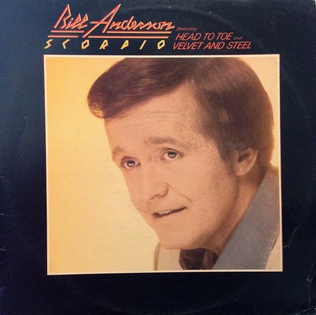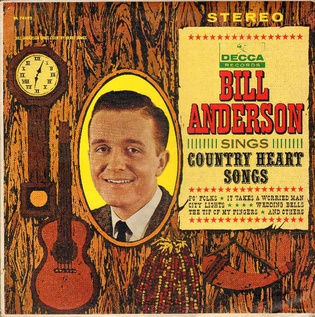
James William Anderson III is an American country music singer, songwriter, and television host. His soft-spoken singing voice was given the nickname "Whispering Bill" by music critics and writers. As a songwriter, his compositions have been covered by various music artists since the late 1950s, including Ray Price and George Strait.

"Still the One" is a song written by Johanna Hall and John Hall, and recorded by the soft rock group Orleans on their album Waking and Dreaming, released in 1976; it reached No. 5 on the Billboard Hot 100.
"I Can't Wait Any Longer" is a single by American country music artist Bill Anderson. Released in April 1978, it was the first single from his album Love and Other Sad Stories. The song peaked at number 4 on the Billboard Hot Country Singles chart. It also reached number 1 on the RPM Country Tracks chart in Canada.
"Peanuts and Diamonds" is a song written by Bobby Braddock. It was first recorded by American country singer-songwriter Bill Anderson. It was released as a single in 1976 via MCA Records and became a major hit the same year.
"Liars One, Believers Zero" is a song written by Glenn Martin. It was first recorded by American country singer-songwriter Bill Anderson. It was released as a single in 1976 via MCA Records and became a major hit the following year.

Peanuts and Diamonds and Other Jewels is a studio album by American country singer-songwriter Bill Anderson. It was released in September 1976 on MCA Records. It was co-produced by Owen Bradley and Buddy Killen. It was Anderson's twenty fifth studio recording released during his musical career and second to be released in 1976. The album included three singles issued between 1975 and 1976, two of which became major country hits in both the United States and Canada.

Scorpio is a studio album by American country singer-songwriter Bill Anderson. It was released in April 1977 on MCA Records and was produced by Buddy Killen. Scorpio was Anderson's 26th studio album as a recording artist and first album release of 1977. Another album would follow later in the year. The project produced two singles that became major hits.

Billy Boy & Mary Lou is a studio album by American country music artists Bill Anderson and Mary Lou Turner. It was released in June 1977 on MCA Records and was produced by Buddy Killen. It was the duo's second studio album together since pairing up as a duet team in the mid 1970s. The album produced two singles between 1977 and 1978. It would be the duo's final studio album together.

Ladies Choice is a studio album by American country singer-songwriter Bill Anderson. It was released in 1979 on MCA Records and was produced by Buddy Killen. His 29th studio album, Ladies Choice, produced two singles that became charting singles on the Billboard country chart. It included a mix of songs composed by Anderson and other songwriters.

Nashville Mirrors is a studio album by American country singer-songwriter Bill Anderson. It was released in 1980 on MCA Records and was produced by Buddy Killen. His 30th studio album, it was also Anderson's final album effort with his long-time record label. The album included three singles that reached minor positions on the Billboard country songs chart.

Bill Anderson Sings Country Heart Songs is a compilation album by American country singer-songwriter Bill Anderson. It was released in January 1962 on Decca Records and was produced by Owen Bradley. Despite it being a compilation, the project was Anderson's debut album release as a recording artist. It featured several of his early hits with the Decca label and included one song that would later be issued as a single in 1962.
"Can I Come to You" is a song written by Jerry Crutchfield and Buddy Killen. It was recorded by American country singer-songwriter Bill Anderson. It was released as a single in 1974 via MCA Records and became a major hit the same year.
"Head to Toe" is a song written by Bobby Braddock. It was first recorded by American country singer-songwriter Bill Anderson. It was released as a single in 1977 via MCA Records and became a major hit the following year.
"This Is a Love Song" is a song written by Jim Weatherly. It was first recorded by American country singer-songwriter Bill Anderson. It was released as a single in 1979 via MCA Records and became a major hit the same year.
"Where Are You Going, Billy Boy" is a song written by Dave Kirby and Glenn Martin. It was first recorded as a duet by American country artists Bill Anderson and Mary Lou Turner. It was released as a single in 1977 via MCA Records and became a major hit the same year.
"Double S" is a song written by Bill Anderson and Buddy Killen. It was first recorded by its co-writer and American country singer-songwriter Bill Anderson. It was released as a single in 1978 via MCA Records and became top 40 hit single.
"The Dream Never Dies" is a song written by Richard Cooper. It was first recorded by his band The Cooper Brothers in 1978 and included on their self-titled Capricorn Records album. It was also released as a single, b/w "Rock and Roll Cowboys". American country singer-songwriter Bill Anderson released it as a single in 1979 via MCA Records and had a top 40 hit single. Juice Newton also recorded the song that same year and released on her Take Heart album.
"Make Mine Night Time" is a song written by Mike Kosser and Curly Putman. It was first recorded by American country singer-songwriter Bill Anderson. It was released as a single in 1980 via MCA Records and became top 40 hit single.
"Country D.J." is a song written and first recorded by American country singer-songwriter Bill Anderson. It was released as a single in 1975 via MCA Records and became top 40 hit single.

The singles discography of American country singer-songwriter Bill Anderson contains 84 singles, three promotional singles, 6 other charted songs and four music videos. After signing to Decca Records in 1958, Anderson released a series of early singles that became hits, reaching the top ten and 20. This included "That's What It's Like to Be Lonesome" (1958), "The Tip of My Fingers" (1960) and "Po' Folks" (1961). The following year, he reached number one on the Billboard Country and Western Sides chart with "Mama Sang a Song." In 1963, Anderson released his most commercially successful single, "Still." The song was his second number one country single and his first top ten hit on the Billboard Hot 100, climbing to number eight. His follow-up single, "8×10" reached similar crossover success. Anderson released 11 more top ten country hits during the rest of the decade. This included the number one singles "I Get the Fever" (1966) and "My Life " (1969). He also had a number one hit with Jan Howard called "For Loving You" in 1968. Anderson also had top ten hits with "I Love You Drops" (1965), "Happy State of Mind" (1968) and a cover of "But You Know I Love You" (1969).









